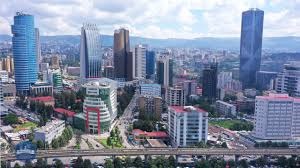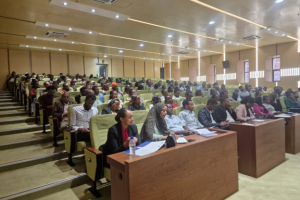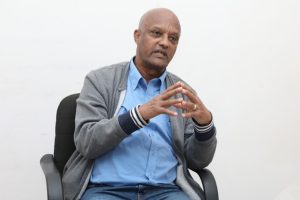
Addis Ababa, the capital of Ethiopia and home to the African Union (AU), the United Nations Economic Commission for Africa (ECA), and numerous other regional and international organizations, is currently undergoing a profound urban transformation, driven by extensive urban renewal and beautification initiatives aimed at beautifying and modernizing the city.
Initiatives, such as the Addis Ababa City Corridor Development Projects and a range of various renovation activities carried out as part of a broader vision of modernizing the city, are significantly reshaping the capital.
These efforts are reshaping the capital’s landscape and enhancing its overall appearance through major infrastructure upgrades, modern construction developments, and the redesign and revitalization of public spaces.
Today, beyond enhancing its visual appeal, these projects are redefining city’s image, positioning Addis Ababa as a dynamic regional hub for economic development, diplomatic engagement, and technological innovation.
Visitors, including officials, tourists, and those who have had the opportunity to visit Addis Ababa and witness its rapid development, have openly expressed their admiration for the remarkable progress the city has experienced in such a short time.
For instance, participants who took part in the 38th African Union Summit and had the opportunity to visit several sites in the capital, including the Adwa Victory Memorial Museum, Unity Park, Friendship Park, and Entoto Park, expressed their astonishment at Addis Ababa’s rapid development and remarkable transformation, praising the efforts and describing the city as a beacon of progress for the African continent.
Likewise, in various times and instances, be it in state visits or international conferences held in Addis Ababa or in other places, several prominent leaders, foreign diplomats, ambassadors, and foreign dignitaries have hailed the government’s efforts and have given recognition to Addis Ababa’s rapid development.
South Africa’s President Cyril Ramaphosa is among the leaders who have praised Addis Ababa’s rapid development, describing it as a “flourishing African city.”
In his speech delivered in Johannesburg in connection with the preparation for the G20 Leaders’ Summit, President Ramaphosa stated the city’s remarkable development, noting that the corridor development project has made Addis Ababa exceptionally beautiful, clean, and attractive for investment.
He also mentioned the city as a blueprint for other African countries to follow, adding that Johannesburg is drawing inspiration from Addis Ababa’s successful corridor development, adopting it as a model for urban renewal and preparations for the G20 summit.
Youth Council President of South Sudan Taban Paride Lokasmoi is also expressed his appreciation for the transformation of Addis Ababa, saying that it serves as a significant indicator of Ethiopia’s overall progress and development, mainly in infrastructure development and economic growth.
As Lokasmoi stated to ENA during the Pan-African Youth Leadership Summit held in Addis Ababa, the transformation of the city is a manifestation of the broader, multifaceted changes taking place across Ethiopia.
Mentioning that he visited numerous cities across several African countries, he said that the ongoing transformation in Addis Ababa is amazing for its rapid pace. He also appreciated the diligence of workers engaged in projects demonstrating exceptional dedication, working tirelessly around the clock to drive progress.
In the same way, delegates who took part in the 20th International Labour Organization (ILO) Regional Conference and visited the capital have lauded Addis Ababa’s rapid infrastructure development, describing the Ethiopian capital as a rising model for African cities.
Speaking to the Ethiopian Press Agency (EPA), Tanzania’s Rural and Urban Roads Agency CEO Lwitiko Mwandobo expressed his admiration for the city’s transformation, calling Addis Ababa “a smarter and more inclusive urban space.”
“This is my first time in Ethiopia, and I’m truly impressed,” Lwitiko said. “The city’s planning is exceptional, from road networks that accommodate bicycles and pedestrians to public spaces designed for recreation and greening. These are features many African cities are still lacking.”
He also pointed to improved traffic management and better urban infrastructure as “clear signs of progress,” suggesting that Addis Ababa’s integrated development model could serve as a blueprint for other African cities.
Echoing similar sentiments, Kenyan delegate Felix Ogutu praised Ethiopia’s job creation initiatives driven by urban industrial development. “Industrial parks like Bole Lemi are game changers,” he said. “I saw many young men and women working there, which is vital for a continent with a growing youth population.”
Felix also emphasized the need for stronger regional cooperation. “Ethiopia and Kenya share common goals in industrialization and youth employment. We have much to learn from each other and many opportunities to collaborate on addressing our shared challenges.”
In related development, visitors who attended the 2025 Regional Erasmus+ Cluster Meeting and Contact-Making Seminar for Sub-Saharan Africa expressed deep admiration for the dramatic transformation of Ethiopia’s capital, particularly its modern infrastructure developments and revitalized appearance.
As Prof. Voda Mihai from Romania shared his impressions with ENA, he mentioned that this is his second visit to Addis Ababa. However, he has observed significant developments since his previous trip. “I have noticed a lot of progress here in Addis. It is much more beautiful compared to January last year. I’m impressed, everything looks more refined, elegant, and civilized,” he remarked, adding the city’s increased greenery, cleanliness, and fresher air.
Zoly Harilala is from Madagascar, it is her first trip to Ethiopia in a decade. “Ten years ago, I saw many construction activities underway. Yesterday, when I arrived, the city was shining at night. There are now so many state-of-the-art buildings. The cleanliness is amazing. Congratulations to all Ethiopians on these great achievements,” she said.
Prof. Kiran Bucha of Mauritius, who previously served at the Mauritian Embassy in Ethiopia in 2014, reflected similar sentiments.
“Addis Ababa feels like a new city. The infrastructural changes are remarkable. It’s a delight to be here, we feel at home,” he said.
Assistant Professor Osumane Sangho from Mali also lauded the city’s progress, suggesting it could serve as a model for other Sub-Saharan nations.
“What I see here is exemplary. Our countries can learn a lot from Ethiopia’s progress,” he remarked.
Indeed, in the past two or three years, Addis Ababa has experienced remarkable development and transformation. The city has seen notable enhancements in infrastructure, increased greenery, and a more modern and cleaner appearance. These impressive changes, acknowledged by both local people and visitors, demonstrate Ethiopia’s rapid progress and firm commitment to creating a more vibrant, sustainable, and welcoming capital for both its residents and visitors.
BY STAFF REPORTER
THE ETHIOPIAN HERALD SATURDAY 24 MAY 2025




